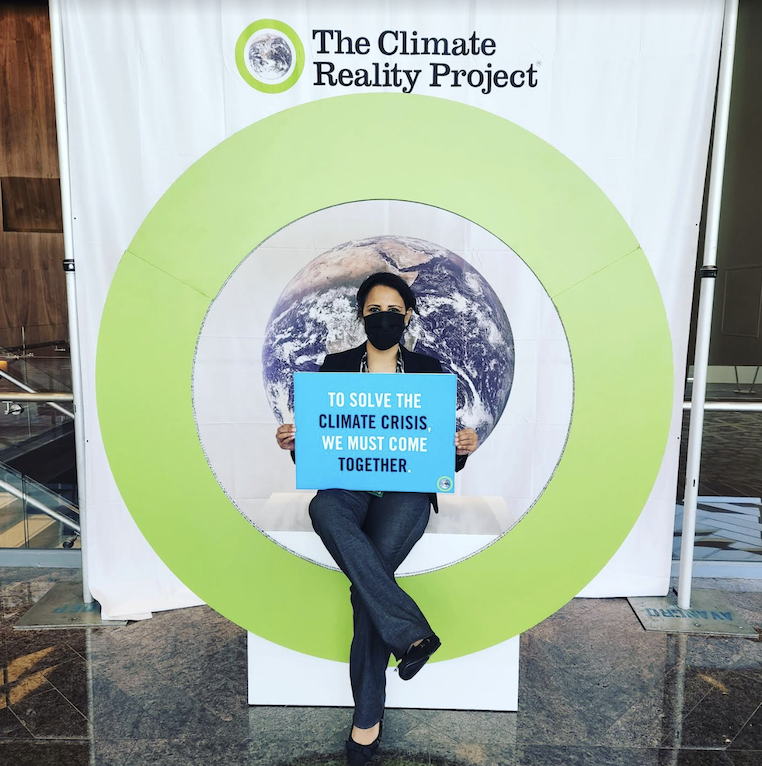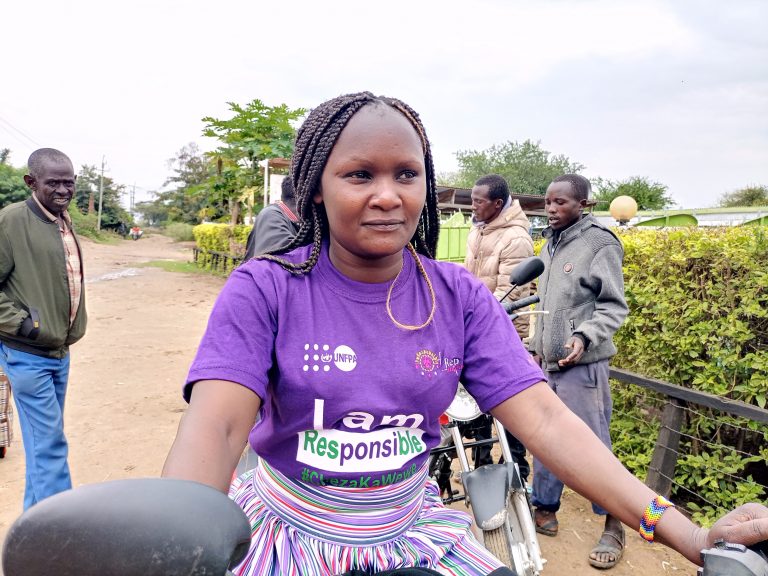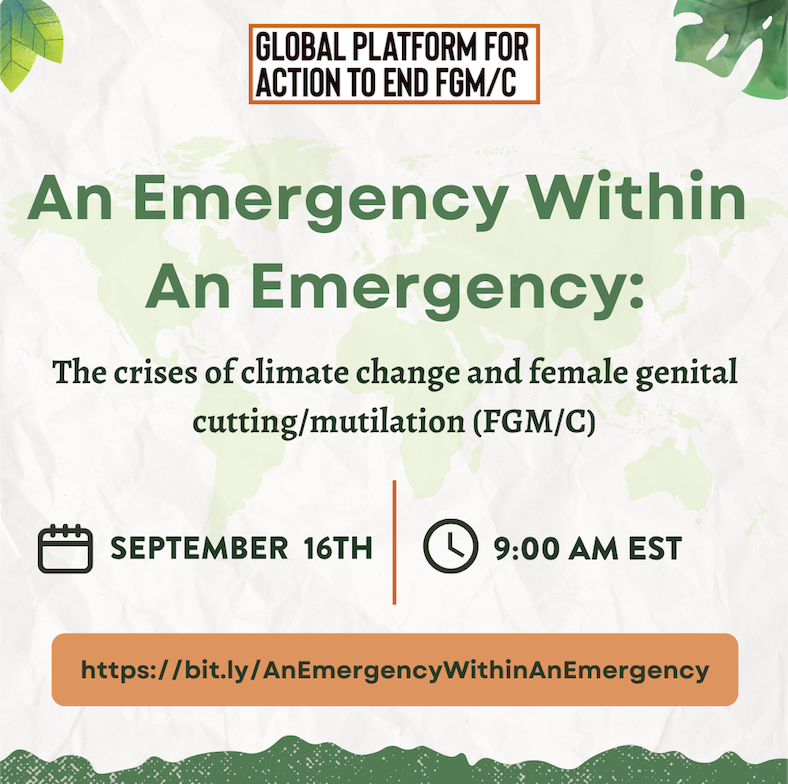The Climate Crisis & Human Rights

By Nesha Abiraj It is an understood global reality that women and girls are facing the harshest impacts of the climate crisis. Yet we seldom hear advocates at the frontlines of the climate crisis, speaking to the impact on human rights. Thankfully, this is changing. In January of 2023, I was invited by the North County Climate Change Alliance in California to present on climate justice and human rights. A few days prior to the presentation, the organizers asked if they could use my Sahiyo Voices Video from 2021 to introduce me as a speaker. Elated, I immediately said yes. On the day of the presentation, my colleague and fellow Climate Reality Leader, Justin Lowery, delivered my introduction. He clearly identified and articulated the connection I was aiming to make: the intersectionality between the climate crisis and the exacerbation of human rights violations, including female genital cutting (FGC), and by extension the need for international climate justice. People were beginning to understand just how much more was at stake, and I was hearing people speak about FGC and child marriage in spaces where I had not otherwise expected to hear it. This past year, after doing similar presentations, people came up to me expressing their shock and deep concern that these harmful practices even existed in the regions and/or communities they lived in. There were people learning about FGC for the first time, and some expressed a desire to learn more so that they could integrate this and other human rights violations into their work on the climate crisis. The UN Secretary General in his 2022 remarks stated that humanity now faces a “collective suicide pact” on account of the climate crisis. According to UNICEF, as the climate crisis pushes more children and families into extreme poverty, 9 million more children may suffer from wasting, the most life-threatening form of malnutrition by the end of 2022. We are now in 2023. More than 200 million women and girls alive today have undergone FGC and more than 400 million girls are now more vulnerable to this harm because of the climate crisis. UNICEF projects that one billion children are at extremely high risk due to the impacts of the climate crisis. In the face of such startling data, how can we not act? Since learning about the climate crisis through training to become a Climate Reality Leader with the Climate Reality Project, as well as continued research, I have integrated the impacts of the climate crisis in my work to promote the protection of women and girls from harmful practices such as FGC. Additionally, recognizing the need for international law and policy to provide a pathway for justice, accountability, and a deterrent to slow the pace of the climate crisis, I have also become an advocate for climate justice with Stop Ecocide International, specifically advocating for ecocide to become the 5th International Crime Against Peace. Simply put, laws geared towards environmental protection are woefully inadequate, and environmental crimes continue to occur at great costs to humanity because these crimes are treated with impunity. The people who are forced to bear the worst consequences of the climate crisis often come from vulnerable regions that are usually the lowest emitters of greenhouse gases. It is their lives that are being upended as a result of actions they had nothing to do with. That includes the women and girls who are now at a heightened risk of having FGC performed on them. The impact of the climate crisis on human rights and the urgent need for climate justice must be made central to any climate related policy. If we proceed as is without integrating these impacts, we run the risk of leaving millions of women and girls behind and at severe risk of harm. Women and girls are counting on us. You can help them by getting more involved in Sahiyo’s work as a volunteer or by signing on to Sahiyo’s petition to the United Nations. You can also support Sahiyo’s efforts by donating. These funds enable Sahiyo to support and train advocates, host educational webinars, and support survivors. In 2021 I was able to participate in the Voices project as an advocate at no cost to me. Two years later I continue to support making it possible for others to have the benefit of these educational and training opportunities at no cost. You too can do the same for someone else. Nesha Abiraj is an International Human Rights Lawyer. She is currently serving in her second year as an Ambassador to Island States and vulnerable coastal regions on International Climate Justice and Human Rights with Island Innovation. She also serves as an Ambassador to Stop Ecocide International, an organisation seeking to make ecocide, which is broadly understood to mean largescale and systematic destruction of nature, the 5th International Crime against Peace. Nesha also serves as a member of the US National Coalition to end early, forced and child marriages and is a US Advisory Board Member to Sahiyo. She previously worked with Human Rights Watch, Save the Children and continues to serve as a Lead Advocate for UNICEF USA on international humanitarian response relating to key poverty focused issues impacting the lives of children living in humanitarian and developmental settings including conflict zones. She is also a Climate Reality Leader and a member of the Commonwealth Lawyers Association.
The urgency of climate change: Reflecting on my conversation with activist Domtila Chesang

by Urvashi Sharma On a foggy day in October, I had the pleasure of speaking with Domtila Chesang, an inspired activist against female genital mutilation/cutting (FGM/C) in Kenya, and more recently a panellist on The Global Platform for Action to End FGM/C’s Climate Change and FGC webinar, to learn about her work and gain a better understanding of how climate change is impacting FGM/C. Though Domtila is not a survivor, her community is one that practices FGM/C: “I grew up in a village where everybody, all the older members of my family, the female members, had undergone FGM.” After a turn of fate allowed Domtila to witness her cousin being cut, she decided that she would not be cut. “I’m telling you one of the reasons why FGM is still happening in some parts of the communities is because of the celebration. It is a huge ceremony…There are dances. There’s singing. It’s like a one- or two-week celebration. That is not at the moment, because now it is against the law The prohibition of Female Genital Mutilation Act 2011… Nobody knows about the actual cutting and the pain and, of course, the suffering that comes after that.” Seeing this damage changed her perception of FGM/C. Luckily, her mother did not pressure her to undergo the practice. “Apart from one of my younger sisters going through it, none of the other girls from my family went through it after myself. So I became the first girl in my village to say I’m not going to be cut.” Over the years Domtila became more and more involved in the work to end FGM/C. “I got involved [in campaigning against FGM] after I went to high school because I wanted to protect more girls… By the time I was going to the university, I was already taking part in mentorships programs, and working with a group of women who had also decided to campaign against FGM… When I left university, I went straight to campaigning.” It wasn’t until I spoke with Domtila that I understood the urgent intersections of FGM/C with climate change: climate change is forcing communities to further invest in this harmful practice for their survival. “Climate change has really pushed people to the limit, beyond their limit, because… we continue to experience the worst impact of climate change, which is now forcing families to resort to the last solution to survive… We are pastoralists… So we entirely rely on livestock for survival… And now that the land has been degraded, now that there is no pasture, now that there’s no water, it’s becoming very, very scarce, and communities have been displaced.” Because FGM/C “is associated with a rite of passage… child marriage, and… acquisition of wealth,” there is a direct link to climate change. From this displacement and loss of sustenance comes the pressure on young girls to undergo FGM/C: “Girls are now at the centre of saving their families… It has become the only commodity apart from their livestock, because girls are not being extinct as livestock is. So the girls’ existence in itself is becoming a threat because right now, it’s becoming a solution to the communities.” Domtila expressed her frustration at the limits of her role in the face of this challenge: “It is really rendering me almost powerless. I cannot feed the community. I cannot provide alternative survival or livelihood to the community.” For me, this raised the question of context when it comes to advocating for values such as autonomy. In situations where survival is on the line, how do we decide who-or what- is more important? When I asked her about the long-term impacts of climate change on FGM/C, she had this to say: “There’s nothing that is being done at the moment. Very little, just a conversation at the global level, that is slightly prevalent at the national level, and there’s nothing at the community level. It is still a theory. And these people are not yet connecting the dots between climate change and all the other impacts. And I am here as a front-line advocate, but I do not really understand the full degree of climate change and how we can mitigate it.” Despite this vast problem and how it impacts her work to end FGM/C, Domtila cannot imagine dedicating her life to any other social issue. “I think everything about my work is valuable and exceptional… What makes me smile all the time is that seeing all these girls shining in their schools and seeing that all these girls have forgotten about FGM.” After our conversation, I was left with a combination of admiration, food for thought, and gratitude for the chance to learn from Domtila. I gained a new appreciation for the role of an activist, re-evaluated my own developing role, and was inspired by Domtila’s fierce promise of protecting the girls in her community. Domtila Chesang has been advocating for girls and women’s rights since 2014 through various initiatives, including working to end female genital mutilation (FGM), child marriage, and other harmful cultural practices. As a full time women’s rights advocate, Domtila founded I_Rep Foundation, a community-based organisation that serves to sensitise her community on the harms and negative implications of the practices by creating awareness and providing platforms at the community levels for learning and dialogues. I _Rep Foundation is currently directly and indirectly providing educational scholarships to close to 100 girls in different schools. Overall, this work has prevented thousands of girls from the cut and supported her community with the capacity to protect their daughters from violence. Domtila with a reformed cutter in Otiot downing her tools (2021).
An Emergency Within an Emergency: The Crises of Climate Change and Female Genital Cutting

Date: September 16th, 2022 Time: 9 am EST Register here today: https://bit.ly/AnEmergencyWithinAnEmergency It is an understood global reality that women and girls are facing the harshest impacts of climate change, and activists across the world continue to fight for the inclusion of women and girls in climate change mitigation and adaptation strategies. Yet, too little is being done to address the multitude of ways in which climate change disproportionately impacts women and girls. One of the common, but often overlooked, impacts of climate change is on female genital mutilation/cutting (FGM/C). Defined by the WHO as any procedure that involves the removal of the external female genitalia for non-medical reasons, FGM/C is internationally recognized as a human rights violation. For many girls across the globe, climate change has only served to make them more vulnerable to this form of harm. Join the Global Platform for Action to End FGM/C on September 16th at 9 am EST as we explore the impact of climate change on female genital mutilation/cutting and hear from the activists themselves who are working to uplift girls in their communities about what can be done. For this event, we will be joined by world-famous activists Eva Komba and Domtila Chesang alongside award-winning journalist Neha Wadekar as they explore their work and experience with this growing issue. This panel will also be moderated by Sahiyo co-founder and passionate activist against FGM/C Mariya Taher. Mariya Taher has worked in gender-based violence for over a decade in the areas of teaching, research, policy, program development, and direct service. In 2018, Mariya received the Human Rights Storytellers Award from the Muslim American Leadership Alliance. In 2020, she was recognized as one of the six inaugural grant recipients for the Crave Foundation for Women. Since 2015, she has collaborated with the Massachusetts Women’s Bar Association to pass legislation to protect girls from FGC. After starting a Change.org petition and gathering over 400,000 signatures, Massachusetts became the 39th state in the U.S. to do so. She also sits on the steering committee for the US End FGM/C Network. As of 2021, Mariya serves as an expert consultant for the Department Of Justice Addressing Female Genital Mutilation/Cutting technical assistance project. Eva Komba is an experienced development professional in the area of international gender and development expert with 10 years of experience. She has major competencies in matters of Public Policy Formulation and Research, Access to gender justice, Sex and Gender Based Violence Programming and Implementation, Ending Harmful Traditional Practises and Combating Trafficking of Women and Girls in Africa. She is also skilled in the area of Monitoring and Evaluation, Gender Responsive Budgeting, Gender Mainstreaming as well as Women Empowerment. Domtila Chesang is a champion fighting to end FGM, child marriage and other harmful cultural practices. She has been advocating for girls and women’s rights since 2014 through various initiatives. As a full time women’s rights advocate, she founded the I_Rep Foundation, which is a community based organization that she uses as a vehicle to create awareness around these issues and provides platforms at the community levels for learning and dialogue. Because of her fearless campaigns and passion for girls and women’s rights protection and empowerment in her community, she has received a number of recognitions both locally and internationally. In 2017, she was among three Kenyans to receive the prestigious Queens Young Leaders Award presented by the Queen of England in Buckingham Palace. In 2018, she was recognized as the African Youth Leader of the year. She was nominated as the Human Rights Defender of the year in 2019. She is also a founding member of the African Women’s Rights Advocate. Neha Wadekar is an independent multimedia journalist reporting across the globe. She reports at the intersections of climate, gender, conflict, health, human rights, emerging democracies, and politics. Neha’s written and video work has been published in The New York Times, The Washington Post, The New Yorker, The Atlantic, The Wall Street Journal, The Economist, PBS NewsHour, the Los Angeles Times, The Guardian, Mother Jones, CNN, and others. She has received fellowships from the Pulitzer Center for Crisis Reporting, the United Nations Foundation, the Fuller Project, the Overseas Press Club, the International Women’s Media Foundation, and the Groundtruth Project.
